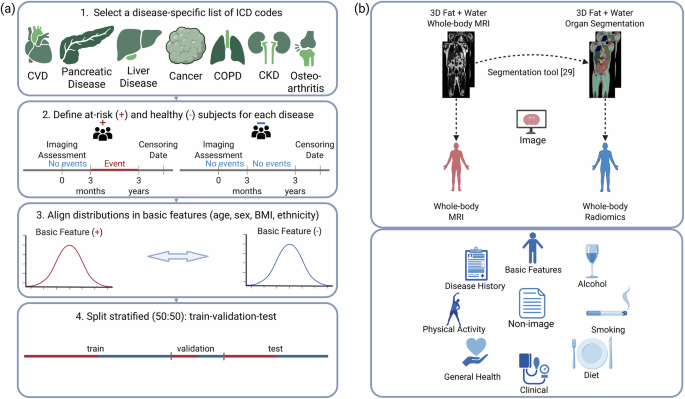Overview of the Study
A recent study conducted by the University of Westminster’s Research Centre for Optimal Health (ReCOH) has introduced an innovative AI method capable of predicting the early onset of 38 age-related diseases by analyzing data from the UK Biobank.
Key Findings
- The research, published in GeroScience on June 27, 2025, indicates that diseases such as rheumatoid arthritis and dementia can be predicted before symptoms manifest.
- This predictive capability allows healthcare professionals to intervene earlier, potentially alleviating the burden on healthcare systems.
Data Analysis
The study analyzed health data from over 60,000 UK Biobank volunteers, incorporating:
- Blood test results
- Body measurements
- Magnetic resonance imaging (MRI) data
- Medical history
This comprehensive dataset was utilized to develop an AI-based risk prediction model that estimates the likelihood of individuals developing specific diseases earlier than the average onset age.
Insights from the Research
Dr. Mica Ji, the study’s lead researcher, emphasized the significance of understanding the age at which health conditions develop, stating:
“The age at which someone develops a health condition is a crucial indicator of their health trajectory.”
Dr. Ji’s research supports the idea that early onset risk for one condition can be a strong predictor for multiple other conditions.
Methodological Advancements
Unlike traditional models that assess risk from the time of a health check, this new approach predicts risk from birth. This allows for the identification of individuals who may be aging faster than their peers, enabling proactive measures to delay disease onset.
Cluster Analysis of Diseases
The study identified three distinct clusters of diseases:
- Cardiometabolic
- Digestive-neuropsychiatric
- Vascular-neuropsychiatric
Developing one disease early often indicates a higher risk for others within these clusters.
Future Implications
Professor Louise Thomas, a contributor to the UK Biobank imaging project, noted:
“This research marks a significant advancement in understanding how and when age-related diseases develop.”
She highlighted the importance of precise imaging in detecting early physiological changes, which is vital for predicting disease onset.
UK Biobank Imaging Project Update
In related news, the UK Biobank has reported that over 100,000 participants have undergone whole-body scans as part of an imaging initiative aimed at enabling earlier detection, improved diagnosis, and more personalized treatment for various conditions.
